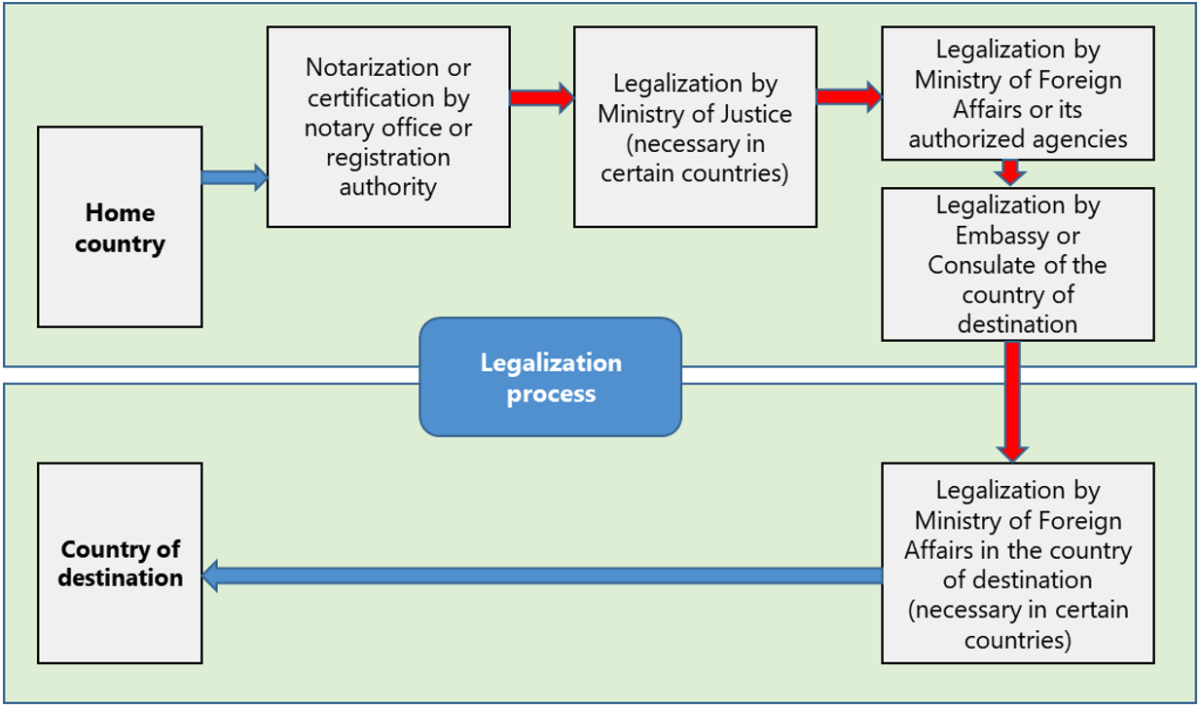China has recently announced its decision to join the Convention Abolishing the Requirement of Legalisation for Foreign Public Documents.

Authentication of signatures or seals on cross-national commercial documents by a series of government agencies is a traditional practice in international trade that is often required to secure transactions. This process is commonly referred to as legalization.
Different countries have varying requirements for the legalization of foreign documents, with some requiring a “three-step legalization” or a “four-step legalization” (as shown in the example below). This process is necessary for the acceptance of foreign documents in various situations, such as company registration and work visa application, but it is often time-consuming and costly in certain countries.

A simpler process is needed
The growing frequency of global trade has created a need for simplifying the authentication process for cross-national documents. The Convention Abolishing the Requirement of Legalisation for Foreign Public Documents, also known as the Hague Convention, was initiated in 1961 as a crucial practice for exempting commercial documents from consular legalization among its member countries.
After decades of adhering to comprehensive legalization practice, China made an announcement on its joining the Hague Convention (“the Convention”) during a regular press conference held by the Ministry of Foreign Affairs on March 10th, 2023. The Convention will become effective in China from November 7th, 2023. Under the Convention, the traditional consular legalization process will be replaced by a simplified process known as the Apostille or Hague Apostille. This involves attaching an Apostille certificate to authenticate the effectiveness of the official seal or the signature of the public official who has signed the public document from the home country. The Apostille process has several advantages, particularly in terms of time and cost, and is recognized by over 120 contracting countries worldwide. For example, in the UK, the Apostille can be obtained within one day under certain conditions.
The Apostille process
The Apostille is usually processed as described below:

Here is a sample of an Apostille certificate:
| Apostille | |||||
| 1 Country: | [home country] | ||||
| This public document | |||||
| 2. has been signed by | [name of public officer] | ||||
| 3. acting in the capacity of | [position of the public officer] | ||||
| 4. bearing the seal/stamp of the | [name of the government authority] | ||||
| Certified | |||||
| 5. at | [authority name] | 6. the | [date] | ||
| 7. by | [information of public officer] | ||||
| 8. No. | [reference no.] | ||||
| 9. Seal/stamp | [seal of authority] | 10. Signature | [Signature of officer] | ||
Further insights
For decades, China has imposed strict requirements on the consular legalization of foreign public documents. Foreign investors have had to undergo lengthy formalities to obtain full legalization of their certificates of incorporation in order to establish their offices in China or to file a change in their company name or signatories. Foreign individuals have also been required to present their legalized degree certificates, certificates of non-criminal record, and other qualification documents when applying for a work visa.
With the implementation of the Convention, we believe that such administrative burdens will be reduced in China. Additionally, we have observed that some Chinese registration authorities in certain cities or administrative districts have already started to ease the requirements for the legalization of foreign public documents. For example, in certain districts of Shanghai City, the Administration of Market Regulation authority no longer requires the legalization of the certificate of incorporation when the investor has a change in its signatories.
We believe that China’s participation in the Convention will further facilitate international trade and the exchange of overseas talent.
How can we help you?
Lena Li
Manager

